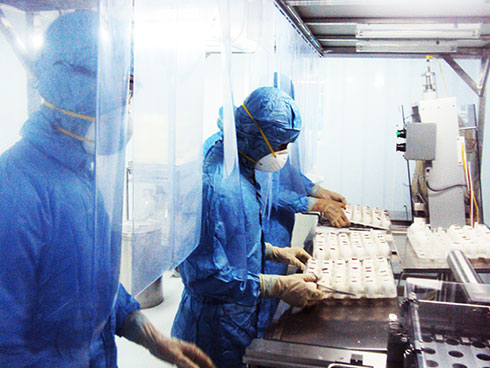
The Institute of Vaccines & Medical Biologicals (IVAC) has successfully produced seasonal influenza and A/H5N1 vaccines. The success has marked a remarkable progress of IVAC in particular and Vietnam in general in the sustainable production of influenza vaccines...
The Institute of Vaccines & Medical Biologicals (IVAC) has successfully produced seasonal influenza and A/H5N1 vaccines. The success has marked a remarkable progress of IVAC in particular and Vietnam in general in the sustainable production of influenza vaccines.
The year 2005 saw the occurrence of avian influenza H5N1, posing a global concern over the significant pandemic threat. The outbreak affected 50% of cities and provinces in Vietnam, leading to the forced killing of more than 50 million poultry. 93 people were infected and 42 died of the disease.

|
Therefore, the Ministry of Health has placed orders with 3 units, namely the National Institute Of Hygiene & Epidemiology, Ho Chi Minh City Pasteur Institute and IVAC to do a research on A/H5N1 influenza vaccine production procedures. Accordingly, the National Institute of Hygiene & Epidemiology chose a research technology based on monkey kidney cells, Ho Chi Minh City Pasteur Institute on Vero cells and IVAC on chicken eggs.
The IVAC’s choice is firstly because this is a traditional technology approved and developed in many countries. Over 90% of flu vaccines available are produced on this technology and more importantly, it suits scientific, technical and financial capacity of IVAC, according to PhD. Duong Huu Thai, IVAC Deputy Director.
In 2007, the World Health Organization (WHO) provided aid for IVAC to build a WHO-GMP standard workshop, get technological transfer in terms of human training to construct a modern production line with a capacity of 1.5-3 million doses of influenza vaccine A/H5N1 a year. Thanks to the financial and technological assistance by the WHO and PATH (the USA), IVAC has successfully researched and produced A/H1N1/09, A/H5N1 and A/H7N9 vaccines. In addition, IVAC has studied and successfully developed the seasonal influenza 3-in-1 vaccine IVACFLU-S in Vietnam with the target of sustainable commercial-scale production of seasonal influenza vaccines.
The first challenge of the production of egg-derived poultry vaccines is finding standard eggs. IVAC has researched and chosen Novogen white chicken for influenza vaccine production. More than 14,000 Novogen white chickens currently raised by IVAC produce 3 million eggs/ year, equivalent to 3 million doses of vaccines, according to PhD. Duong Huu Thai.
The 2 types of influenza vaccines successfully produced by the IVAC are IVACFLU-S (seasonal influenza vaccine) against the Influenza B virus and the H1N1, H3N2; and IVACFLU-A/ H5N1 against the H5N1 subtype of the Influenza A virus. The 2 types of influenza vaccines have successfully undergone clinical trials, meeting the quality, safety and efficacy standards by WHO and requirements of Vietnam. The seasonal influenza vaccines produced by the IVAC are expected to be available on the market in 2019 with the annual production capacity of 1-1.5 million of doses priced at VND80,000 – 100,000 each, only one-third or half of imported ones.
The successful production of influenza vaccines and sustainability for vaccine manufacturing has established Vietnam as a pioneer in vaccine development and production among low and middle-income countries. The IVAC’s efforts to produce influenza vaccine in the country not only benefit Vietnamese people, but also help increase the supply of flu vaccines in the region and the world, according to Guido Torelli, WHO representative.
Cat Dan
Translated by N.T










